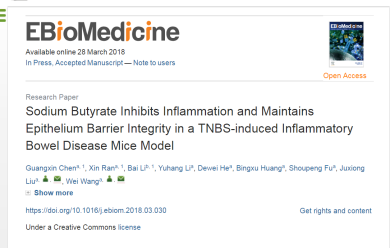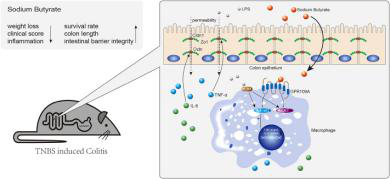In an exciting discovery, researchers of Animal physiology department in College of Veterinary Medicine find that inhibition of macrophages with sodium butyrate by targeting GPR109A have a protective effect on experimental colitis. their research paper was accepted by 《EBioMedicine》,which was published in collaboration with CellPress and LANCET.
Researchers assessed the anti-inflammatory activity of sodium butyrate (SB) on 2,4,6-trinitrobenzene sulfonic acid (TNBS)-induced colitis mice, an experimental model that resembles Crohn’s disease, and explored the potential mechanism of SB in inflammatory bowel disease (IBD). SB significantly ameliorated the inflammatory response and intestinal epithelium barrier dysfunction in TNBS-induced WT mice, but failed to provide a protective effect in TNBS-induced GPR109a−/− mice. They also demonstrated that inhibiting release of Inflammatory cytokines from macrophages by sodium butyrate will attenuate intestinal epithelium barrier dysfunction and reduce colon inflammation.
These findings therefore extend the understanding of GPR109A receptor function and sodium butyrate on intestinal health, they also provide a new theoretical basis for treatment of IBD.
This study was supported by National Nature Science Foundation of China (31572479, 31702211, 31602020) and Graduate Innovation Fund of Jilin University (2017168).

